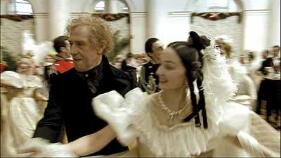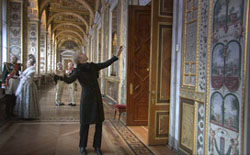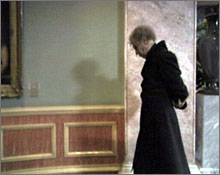Breathing History: Russian Ark on DVD
by dave heaton
 "Imagine you are walking along surrounded by all these ancient people who step out of their portraits. You take a lady by the arm, or test your fencing skills against one of the knights from the Knights' Hall," a man says during Elfi Mikesch's film Mon Paradis (The Winter Palace), a documentary about the Hermitage museum and the people who work there which is included on the DVD for Alexander Sokurov's film Russian Ark. The man is describing the appeal of walking through the museum, interacting with art and history. That interaction is at the center of Russian Ark; the film is essentially a portrait of the Hermitage museum as a living, breathing place.
"Imagine you are walking along surrounded by all these ancient people who step out of their portraits. You take a lady by the arm, or test your fencing skills against one of the knights from the Knights' Hall," a man says during Elfi Mikesch's film Mon Paradis (The Winter Palace), a documentary about the Hermitage museum and the people who work there which is included on the DVD for Alexander Sokurov's film Russian Ark. The man is describing the appeal of walking through the museum, interacting with art and history. That interaction is at the center of Russian Ark; the film is essentially a portrait of the Hermitage museum as a living, breathing place.
"I open my eyes and I see nothing," the narrator to the film begins as we join him in darkness. Then before our eyes the nothingness switches to a vision of people, dressed as they would be in 18th century Russia, climbing out of a carriage and proceeding into the museum. "Where am I?", the narrator asks, and we share in his confusion. Following dressed-up men and women down hallways and through rooms where personalities from various periods of Russian history reside and interact with each other, we feel like we're within some sort of theme-park ride collapsing all of Russian history into one experience. The entire film is a journey through Russian history and culture via the museum's exhibits and artifacts.
On the DVD commentary track, producer Jens Meurer accurately describes the film as "an 86-minute uninterrupted adventure ride," referring to the aspect of the film that has received the most attention, the fact that it was shot in one complete take, with no editing. That is a remarkable achievement, a cinematic landmark, yet it shouldn't be the beginning and end of all conversations about the film. In the making-of documentary Film In One Breath, also included on the DVD, director Sokurov makes it clear that the continuous cut means nothing to him, that it is a tool, not an end in itself.
More than just a showcase for technique and technology, the film offers an active conversation about Russian history and culture, and especially about the love/hate relationship between Russia and Europe. The narrator (who we never see) is joined for his journey through the museum by a French Marquis (played by Russian theater actor Sergei Dreiden); the dialogue between the two brings out the differing perspectives Russians and Europeans have on the status, history and culture of Russia.
 The extent to which the film works for the viewer as a dialogue about Russian history depends in part on the viewer having at least a basic familiarity with the historical figures and events of Russia. As someone who lacks such a knowledge, I admit to feeling lost at sea among all of the faces and references. So while Sokurov's assertion that the film "is very simple, everything in it is clear" is no doubt true for Russian audiences or viewers familiar with Russian history, it's not quite as true for people like me who are more ignorant when it comes to the history of Russia. That is not a criticism of the film or the filmmaker, just an acknowledgement that I had an extra barrier to cross in experiencing the film, as one often does with cross-cultural engagement of this kind.
The extent to which the film works for the viewer as a dialogue about Russian history depends in part on the viewer having at least a basic familiarity with the historical figures and events of Russia. As someone who lacks such a knowledge, I admit to feeling lost at sea among all of the faces and references. So while Sokurov's assertion that the film "is very simple, everything in it is clear" is no doubt true for Russian audiences or viewers familiar with Russian history, it's not quite as true for people like me who are more ignorant when it comes to the history of Russia. That is not a criticism of the film or the filmmaker, just an acknowledgement that I had an extra barrier to cross in experiencing the film, as one often does with cross-cultural engagement of this kind.
That the film's basic atmosphere is dream-like makes the film-watching experience transcend this barrier to an extent (i.e. viewers feel lost anyway, as the narrator does). That the film's structure feels free-form, like you're ambling through time and space and back again, means that a feeling of puzzlement is appropriate. It's a testament to the film's intoxicating nature, both visually and intellectually, that it captures me even when I feel, to be honest, completely lost as far as who is who and what is going on. As an un-informed American viewer, I approach the film with a sense of distance from the material that someone from Russia wouldn't have. Yet each viewing pulls me closer in.
 In the Film In One Breath documentary, there's a moment when the director of the Hermitage misspeaks, referring to "all museum rides" when he means to say "all museum rules." It's a brief moment but a telling one. A museum, especially one as deep and complex as the Hermitage, appeals to the senses, emotions and intellect all at once, with the impact and energy of a thrill ride. A museum is, as Sokoruuv calls the Hermitage, "a world in its own right." Russian Ark captures the awe to be found in a museum in a way that reflects the awe found in human history, in art, culture and affairs of humankind. As a serious consideration of human behavior, within and across cultures, that is filled with references to serious and horrific historical occurrences, the film has a plaintive, melancholy tone that complements the feeling of wonder to contained within museum-going and film-going. The film is ultimately sad, beautiful and hopeful at the same time…it brings out the disparate emotions that arise when thinking about human existence, and what people create and destroy during the time that they are on this earth.
In the Film In One Breath documentary, there's a moment when the director of the Hermitage misspeaks, referring to "all museum rides" when he means to say "all museum rules." It's a brief moment but a telling one. A museum, especially one as deep and complex as the Hermitage, appeals to the senses, emotions and intellect all at once, with the impact and energy of a thrill ride. A museum is, as Sokoruuv calls the Hermitage, "a world in its own right." Russian Ark captures the awe to be found in a museum in a way that reflects the awe found in human history, in art, culture and affairs of humankind. As a serious consideration of human behavior, within and across cultures, that is filled with references to serious and horrific historical occurrences, the film has a plaintive, melancholy tone that complements the feeling of wonder to contained within museum-going and film-going. The film is ultimately sad, beautiful and hopeful at the same time…it brings out the disparate emotions that arise when thinking about human existence, and what people create and destroy during the time that they are on this earth.
Copyright (c) 2005 erasing clouds |
|